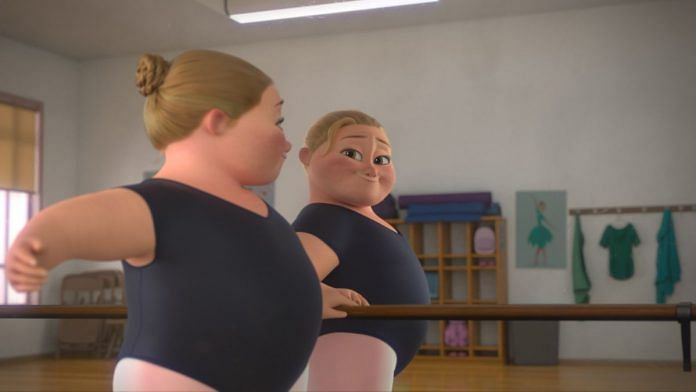Have you ever felt like a joke? I am not talking about the time your actions were mocked by your friends or when a lover didn’t give you what was due. I’m asking if you have ever felt like a joke just for existing. If you’ve ever avoided mirrors, taking your clothes off in the shower or having sex with lights on. If you’ve simply refrained from wearing anything that shows your dimpled skin. Unfortunately, this feeling isn’t alien to a textbook ‘fat’ person—an emotion Disney+ Hotstar’s latest short movie, Reflect, beautifully captures.
Reflect is the 6th short in the second season of Short Circuit, an anthology of experimental films from Disney Studios.
It follows the story of Bianca, a ballet dancer with a belly. She doesn’t like looking in the mirror, but she’s surrounded by them—after all, she’s at a dance studio.
As the Ballet teacher approaches the girl, she makes things worse: “Tummy tucked in and a long neck,” she instructs Bianca, who then feels even more suffocated and imprisoned.
Feeling trapped, she does what she does best—dance. As she dances, she becomes one with her body, discovering its grace, poise, stance, flow—and when she opens her eyes, she looks into the mirror confidently.
She’s understood her body is much more than fat. It’s beautiful.
Also read: Social media platforms show filtered reality. We should learn to take breaks
Fat in popular culture
The visual depiction of Bianca’s feelings is easy to empathise with, especially for those who feel inadequate about their looks.
But nobody can identify with the perpetual entrapment that a big-bodied person feels. Our cellulite is mixed with self-resentment and hate. And ‘fat jokes’ are just new serums being injected into those chubby folds.
That’s the life most fat people live. Walking around with flab in a world where fat jokes reign supreme. Needless to say, it is not an easy feat.
Plump characters who aren’t bitter about their appearance are basically non-existent on screen. Fat people in pop culture are either undesirable losers (George Costanza from Seinfeld), understudy best friends of the protagonist (Sweetu from Kal Ho Na Ho), or the shameful past of a character who is now sexy (Monica from Friends).
Films to songs to books, fat women are constantly mocked, often depicted as repugnant ladies who are undeserving of a charming prince.
Take Taylor Swift’s latest single, Anti-Hero, which has garnered criticism for being fat-phobic. One shot depicts Swift’s personal struggles with body image, where she stands panicked on a weighing scale that reads ‘fat.’ She has now removed this reference from her video. Even Meghan Trainor’s hit song All About That Bass, which supposedly celebrates curves, doesn’t adequately portray voluptuous people.
With so much fat-phobic content being drilled into our brains over and over again, it is easy to develop and harbour a kind of hate for yourself that doesn’t go away easily — even if the fat disappears one day.
The way Reflect deals with body insecurity is commendable and is something I don’t remember seeing before. But it’s not like normal depictions of fat people are missing from mainstream content.
Also read:
Diversity in representation
Toothbrush, a song by former band DNCE helmed by Joe Jonas, shows the latter romance a plus-size model. It is one of those rare instances where the woman is shown as desirable even though her tummy isn’t flat. Look eastward and Vidya Balan—without marketing herself as one—champions the cause of overweight women in Northern India. The way she expresses her struggles with food and weight, and accepts her figure, is unique in a shallow industry that doesn’t offer inspiring figures to impressionable minds.
One criticism of the body positivity movement is that it somehow endorses an unhealthy lifestyle. I disagree. It’s not like ‘thin’ people survive on veggies, timely meals and never look at alcohol. And it’s not like all fat people only drink Coke instead of water, smoke cigarettes and never look at the gym. Fit and thin aren’t synonyms.
Look around you— fat people are all around you. That attribute doesn’t necessarily give you opportunities to joke about their looks. It’s normal.
As the clamour for diversity in representation grows, one hopes that fat people finally get their due of not being ‘abnormalised’ in pop culture. What’s abnormal is the Instagram body with an hourglass figure, protruding buttocks and enhanced breasts. That’s the skewed ‘body positivity’ you must fight.
(Edited by Zoya Bhatti)



